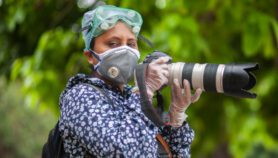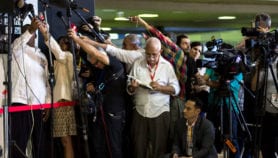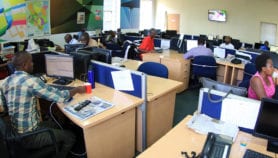By: Naomi Martin
Send to a friend
The details you provide on this page will not be used to send unsolicited email, and will not be sold to a 3rd party. See privacy policy.
[LONDON] The 7th World Conference of Science Journalists (WCSJ), to be held in Cairo, Egypt, in 2011, will surpass the achievements of the sixth, its co-director has promised.
"We’re going to aim even higher," said Nadia El-Awady, newly-elected president of the World Federation of Science Journalists (WFSJ), who will be co-directing the conference, the location of which was announced this week (1 July) at the 6th WCSJ meeting in London, United Kingdom.
The London conference is said to have been the biggest and best to date, with more than 900 science journalists gathering for a large and varied programme. But El-Awady said that even more can be expected from Cairo.
She told SciDev.Net that journalists can expect a very international perspective at the conference, something she feels has been lacking in previous conferences — including London.
"There were lots of participants from all over the world: in that sense it was international. But with regards to producers, speakers and topics, it was very Northern," she said.
The Cairo conference will also give journalists the opportunity to learn about how science is conducted in "a part of the world that they are not used to". There will be post-conference field trips organised to sites within Egypt and other parts of the Arab world and Africa, she promised.
El-Awady, who is a SciDev.Net trustee, said that Qatar has already pledged to provide scholarships for journalists. The committee is speaking to colleagues in Kenya, Nigeria and Uganda to explore the possibility of arranging field trips and workshops with organisations in those countries.
The conference will be co-organised by the Arab Science Journalists Association (ASJA) and the National Association of Science Writers in the United States, a partnership that swung the vote in Cairo’s favour according to outgoing WFSJ president Pallab Ghosh.
"It was a difficult decision because all the bids were strong and each had their merits," Ghosh said. "However, the factor that distinguished the winning bid was the collaborative effort between the Arab and American associations. We are certain that this will be a fruitful collaboration." The two associations have been collaborating for some years.
"What is most exciting about Cairo is how it will be done," El-Awady told SciDev.Net. "The fact that we’re building on an established partnership makes the conference very unique and gives it strength."
Cairo’s rivals were Finland, Kenya and Uganda. Ghosh said that the executive board was especially pleased that so many bids had come from Africa.
The ASJA is still in its infancy. It was officially launched in December 2006 but El-Awady told SciDev.Net that the network behind it has been building for about six years. She said that despite having no paid, permanent staff and no formal means of marketing, the network’s growth has been a "gradual but stable one". She says its success is down to the simple action of establishing an ‘e-group’ for journalists, enabling them to keep in contact, discuss issues and exchange articles.
The conference is provisionally scheduled for April 2011.













